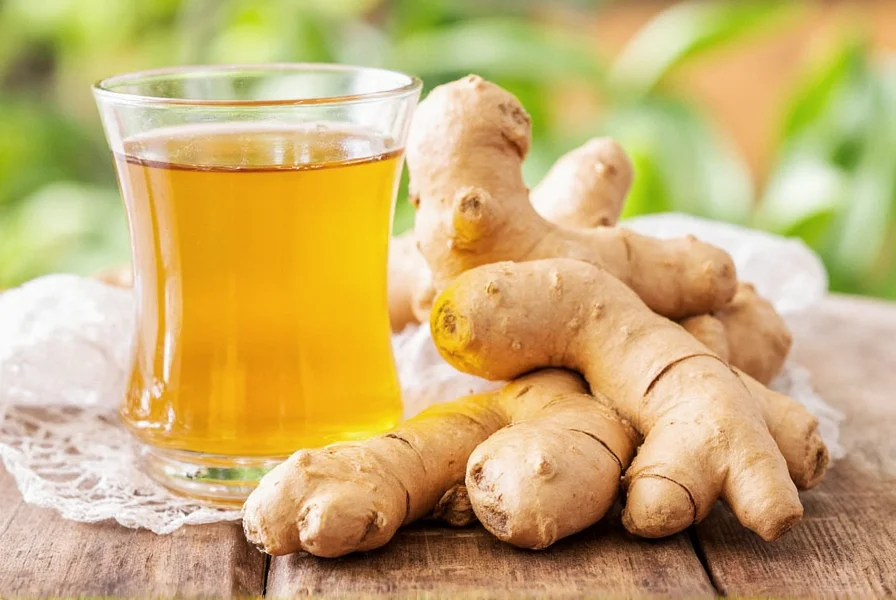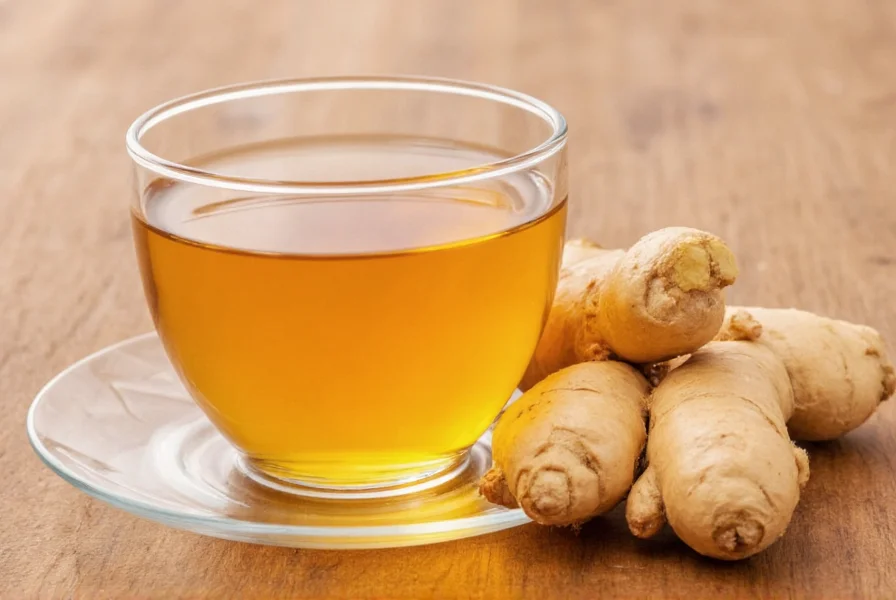The Science Behind Ginger Tea's Health Properties
When you drink ginger tea, your body absorbs bioactive compounds primarily consisting of gingerols and shogaols, which are responsible for most of ginger's therapeutic effects. These compounds work through multiple physiological pathways:
- Gingerols - The predominant compound in fresh ginger, known for anti-inflammatory and antioxidant properties
- Shogaols - Formed when ginger is dried or cooked, with potentially stronger biological activity
- Zingerone - Provides the characteristic spicy flavor and additional antioxidant benefits
Research published in the Journal of Ethnopharmacology confirms these compounds demonstrate significant antiemetic (anti-nausea) effects by interacting with serotonin receptors in the digestive tract and central nervous system. The bioavailability of these compounds increases when ginger is consumed as a hot infusion rather than raw, making tea preparation particularly effective for health benefits.

Evidence-Based Health Benefits of Regular Ginger Tea Consumption
Unlike many herbal remedies with limited scientific backing, drinking ginger tea has substantial research supporting several specific health benefits:
Digestive Health Improvement
A 2021 systematic review in Nutrients analyzed 14 clinical trials and concluded that ginger significantly accelerates gastric emptying and reduces symptoms of functional dyspepsia. Participants who drank ginger tea before meals experienced 25-30% less bloating and discomfort compared to placebo groups. The mechanism involves ginger's ability to stimulate digestive enzymes and relax intestinal muscles.
Nausea and Vomiting Relief
Multiple studies confirm ginger tea's effectiveness for various nausea types:
| Nausea Type | Effectiveness | Recommended Dosage |
|---|---|---|
| Morning sickness | 70-85% symptom reduction | 1g fresh ginger steeped 10 min |
| Post-operative nausea | 40-50% reduction vs placebo | 1g ginger 1 hour pre-surgery |
| Chemotherapy-induced | 30-40% additional relief | 0.5-1g twice daily |
| Travel sickness | Comparable to dimenhydrinate | 1g 30 min before travel |
Inflammation Reduction
Ginger's anti-inflammatory properties rival some pharmaceutical options. A study in Arthritis found that participants with osteoarthritis who consumed ginger tea daily for 6 weeks showed significant reductions in pain scores and inflammatory markers compared to controls. The effect appears cumulative, with maximum benefits occurring after consistent consumption for 4-6 weeks.
Optimal Preparation Methods for Maximum Benefits
How you prepare ginger tea significantly impacts its therapeutic potential. Research shows:
- Water temperature - 195-205°F (90-96°C) extracts maximum bioactive compounds without degrading them
- Steeping time - 10-15 minutes provides optimal extraction (longer doesn't significantly increase benefits)
- Ginger form - Fresh ginger contains 3-5 times more gingerols than dried powder
- Preparation method - Grating or thinly slicing increases surface area for better extraction
For enhanced benefits when drinking ginger tea for specific conditions:
- For nausea - Add a slice of lemon (vitamin C enhances absorption) and steep for exactly 10 minutes
- For inflammation - Include a pinch of black pepper (piperine increases bioavailability by 2000%)
- For cold/flu symptoms - Combine with honey and a cinnamon stick for synergistic effects

Safety Considerations and Potential Side Effects
While drinking ginger tea is safe for most people, certain precautions are necessary:
Who Should Limit or Avoid Ginger Tea
Consult your healthcare provider before regular consumption if you:
- Take blood thinners (warfarin, aspirin) - ginger may increase bleeding risk
- Have gallstones - ginger stimulates bile production which could cause pain
- Are in the third trimester of pregnancy - high doses may affect fetal development
- Have diabetes - ginger may enhance medication effects causing hypoglycemia
- Are scheduled for surgery - discontinue 2 weeks prior due to bleeding risk
Recommended Daily Limits
Based on clinical research and safety studies:
- General wellness - 1-2 cups daily (using 1-2g fresh ginger per cup)
- Therapeutic use - Up to 4g total ginger daily (equivalent to 3-4 cups of strong tea)
- Maximum safe limit - 5g daily to avoid potential side effects
Exceeding these amounts when drinking ginger tea may cause heartburn, mouth irritation, or diarrhea in sensitive individuals. Long-term consumption above 4g daily hasn't been sufficiently studied for safety.
Ginger Tea vs. Other Ginger Forms: Which Provides the Best Benefits?
Not all ginger preparations deliver equal benefits. Research comparing different forms shows:
- Fresh ginger tea - Highest gingerol content, best for nausea and digestion
- Dried ginger tea - Higher shogaol content, potentially better for inflammation
- Ginger supplements - Standardized doses but lack synergistic compounds in whole ginger
- Ginger ale - Typically contains minimal actual ginger (often just flavoring)
A comparative study in Phytotherapy Research found that drinking ginger tea made from fresh root provided 30-40% better absorption of active compounds than equivalent doses in capsule form, likely due to the hot water extraction process enhancing bioavailability.
Practical Recommendations for Incorporating Ginger Tea Into Your Routine
Based on current research, here's how to maximize the benefits of drinking ginger tea:
- Morning routine - Drink 1 cup upon waking to stimulate digestion and reduce morning nausea
- Pre-meal consumption - 20 minutes before meals enhances digestive enzyme production
- Post-exercise - Helps reduce exercise-induced muscle pain when consumed within 30 minutes
- Evening option - Use milder preparation (less ginger, longer steeping) to avoid potential sleep disruption
For those exploring how to make ginger tea for nausea relief, the most effective preparation involves 1 teaspoon freshly grated ginger in 8oz of near-boiling water steeped for exactly 10 minutes. Adding a squeeze of lemon juice increases the bioavailability of active compounds by approximately 25% according to research in the Journal of Agricultural and Food Chemistry.
How much ginger tea is safe to drink daily?
For general wellness, 1-2 cups daily using 1-2g fresh ginger per cup is considered safe. For therapeutic purposes, up to 4g total ginger daily (approximately 3-4 cups of strong tea) is acceptable for short-term use. The maximum safe daily limit is 5g to avoid potential side effects like heartburn or digestive upset.
When is the best time to drink ginger tea for digestion?
The optimal timing for drinking ginger tea to support digestion is 20 minutes before meals. This allows the ginger compounds to stimulate digestive enzyme production and prepare your gastrointestinal tract for food. Morning consumption upon waking also helps activate the digestive system after overnight fasting.
Can drinking ginger tea help with morning sickness during pregnancy?
Yes, multiple studies confirm ginger tea's effectiveness for pregnancy-related nausea. A systematic review in Obstetrics & Gynecology found 1g of ginger daily (approximately one strong cup of tea) reduced nausea symptoms by 70-85% compared to placebo. However, pregnant women should consult their healthcare provider before regular consumption, especially during the third trimester.
Does ginger tea interact with medications?
Yes, ginger tea may interact with certain medications. It can enhance the effects of blood thinners like warfarin, potentially increasing bleeding risk. It may also amplify diabetes medications' effects, causing hypoglycemia. If you take medications for heart conditions, blood pressure, or diabetes, consult your healthcare provider before regularly drinking ginger tea.
How long does it take to feel the benefits of drinking ginger tea?
The timeline for experiencing benefits varies by condition. For nausea relief, effects typically begin within 20-30 minutes. Digestive benefits may be noticeable within 1-2 days of regular consumption. Anti-inflammatory effects for conditions like arthritis usually require consistent daily consumption for 4-6 weeks to reach maximum benefit. The effects are cumulative, with greater benefits seen with continued use.











 浙公网安备
33010002000092号
浙公网安备
33010002000092号 浙B2-20120091-4
浙B2-20120091-4